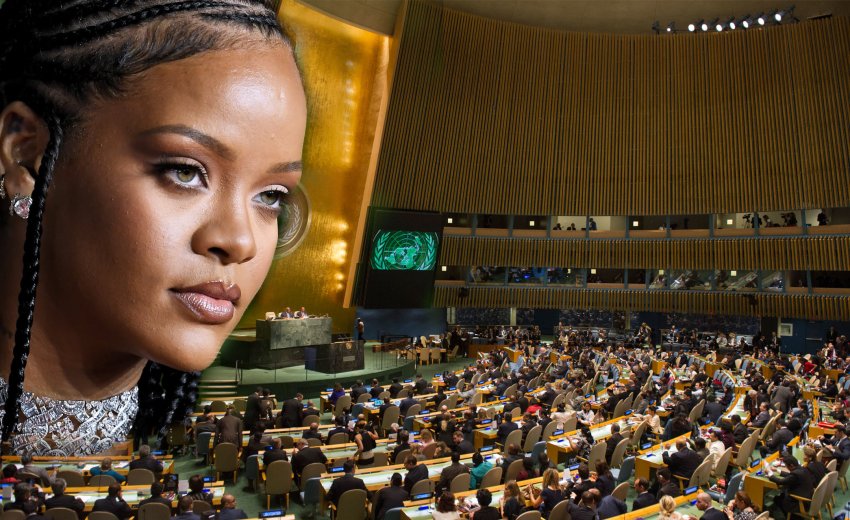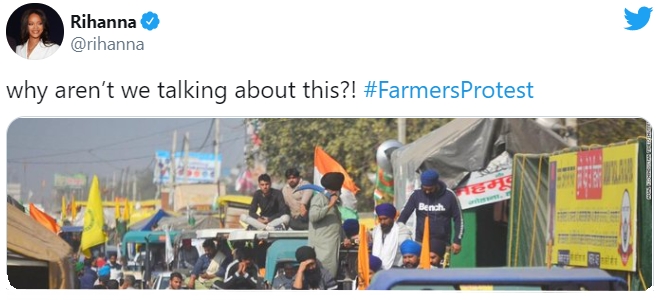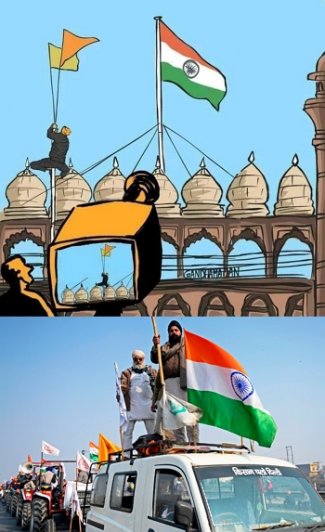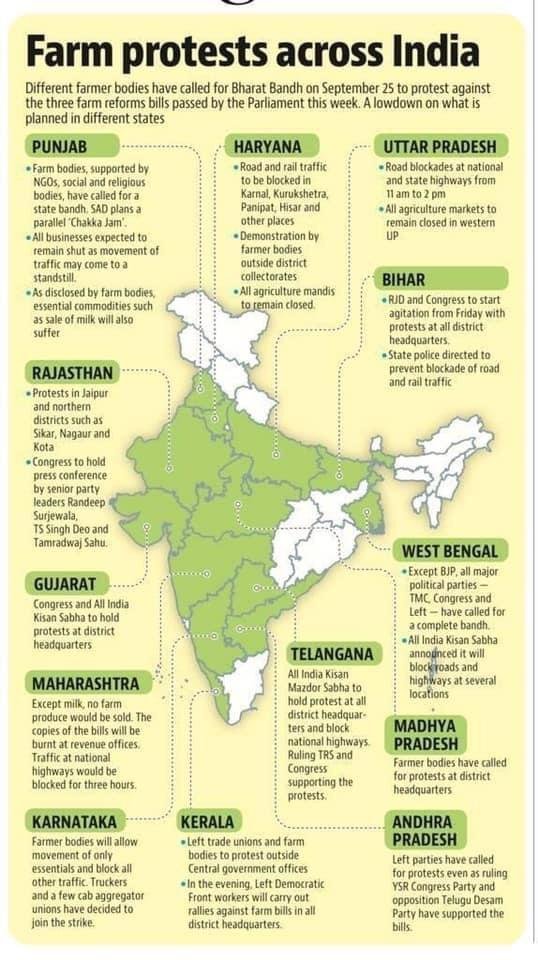If you just look at the text it might seem like a common sense, pretty much obvious, comment, "Why aren't we talking about this?!"
This simple question, composed of 6 basic words, by itself is relatively benign. But given the heavy weight of the context under which Rihanna asked this question (authoritarian communication ban against protesters and over 100 missing persons), it can easily be seen as a 'soft touch' if anything. Certainly it is not offensive or provocative.
However, another celebrity retorted to Rihanna's tweet with "No one is talking about it because they are not farmers they are terrorists."
Woah! What!? You can agree or disagree with agricultural policy but protesting in a democracy is in no way a terrorist activity. Highlighting the plight of protesters does not warrant such hyperbolic responses.
This incendiary sentiment was surely a reaction from an infamous incident that occurred last week where protesters in Delhi raised the Sikh flag at the red fort. As has been well established that the protesters who raised the Sikh flag were visually not seditionists or separatists, among them were an unknown amount of fellow protesters also waving the Indian national flag. National pride was clearly welcome among them. There is ample social media evidence to observably disprove this "terrorist" claim.
While it is true that there has been a contingent of Sikhs who do call for a separate state, the farm leaders themselves have been very clear that is not what they are advocating for. Their focus is exceptionally narrow and clear: the repeal of the 3 farm bills.
The subject of censorship is raging in the U.S. after twitter and a slew of other companies barred the former president. While there is world-wide debate about American politics of division, including the German Prime Minister weighing in on the actions of twitter, the most notable characters raising the same question about India are mostly Punjabi figures. In other words this humanitarian issue hasn't gotten it's proper due outside of Punjabi circles. There has been some understanding from independent Indian journalists and countrymen, but their voice is also not given prominence in the national and especially international discourse.
Which is why there has been an overwhelming outpouring of appreciation on behalf of the farmers and the protest supports to Rihanna. With her over 100 million strong following on twitter she has penetrated the subject outside of it's proverbial bubble.
So what was Rihanna actually talking about? She reposted an article from CNN title 'India cuts internet around New Delhi as protesting farmers clash with police'. The article states,
"Dozens of officers were injured and one protester died when a tractor overturned during the protests near Delhi police headquarters, police said Wednesday. More than 100 protesters are still missing, Samyukta Kisan Morcha said Sunday. An internet shutdown was also imposed in areas around New Delhi from midday to midnight on Tuesday."
Why wasn't the response to Rihanna on the substance of the article? A more appropriate response might be to instead ask about the 100 missing people CNN reported on.
But there has been a lot more news than just that one from CNN and a lot more issues than communication black outs and missing persons.
The New York Times recent article titled 'Modi’s Response to Farmer Protests in India Stirs Fears of a Pattern' states, "Groups that track internet freedom say India’s is slipping."
The Guardian article titled 'India blocks mobile internet at sites of farmers’ protest' says,
"India blocked mobile internet services in several areas surrounding Delhi on Saturday as protesting farmers began a one-day hunger strike after a week of clashes with authorities that left one dead and hundreds injured."
The BBC has also addressed this concerning development with an article titled, 'India blocks mobile internet at sites of farmers’ protest'.
There are other hugely concerning reports regarding abuse of power:
Human Rights Watch, an international NGO that conducts research and advocacy into human rights, condemned the "baseless criminal charges" against senior journalists in India.
It said: "The Indian authorities should drop the charges, which include sedition, promoting communal disharmony, and making statements prejudicial to national integration."
And even more concerning reports of a failed assassination campaign targeting farm union leaders,
The assassin said he was to be paid 10,000 rupees by the Station House Officer, Pradeep Singh, of Rai Police Station in Sonipat Haryana, to be part of a team that would dress up as police officers and shoot four lead figures of the farmers protest at the planned Republic Day rally (26 January).
The assassin, whose identity was kept hidden, said he had been working in such a role for four years with others. His role included disrupting and attacking various protests. The assassin also revealed he was part of at least two teams dispatched by Indian authorities to attack protesters and disrupt the Republic Day rally.
Citizens going on hunger strikes, protesters dying, police brutality, national media being busted for overt bias against Sikhs, silencing and abuse of journalists, more than a 100 missing persons, paid assassination campaigns, and internet communication shut downs.... and THIS is not worth talking about because.... why? Because of easily debunked talk of terrorism?
On the contrary, it is worth talking about. The appropriate call, by any account, would not just be for 'diplomacy over authoritarianism' but more importantly: An international call for investigations into human rights abuses.
Are CNN The New York Times, Guardian and BBC supporting terrorism by lightly addressing some of these serious issues? Again, it is one thing to agree or disagree with agricultural policy, it is quite another to ignore human rights issues.
Has the UN spoken? Are they forming an investigative team to verify if there are any human rights abuses by this world super power? Has the president of the US expressed concern for violence against the freedom of assembly? Have European leaders expressed the same concern they do for Indian censorship as they do about the U.S.? Have Canadian leaders, with large Punjabi constituencies who will have brought it to their attention, exercised a responsible response? These are the kinds of questions that seem appropriate given the situation that has unfolded.
Previous to Rihanna there had been a few figures outside of the Punjabi community that had expressed support and concern, it hasn't gotten a response that truly speaks to the weight of the situation: one of the biggest protests in modern times being silenced by the world's largest democracy.
And why not?
It's a perfectly valid question. And Rihanna asked it as any reasonable person might.
Opinions are not more valid because a person is a celebrity, but in this case it happens to be the celebrity was not only right to bring up the question, but very light handed given the grave nature of what is happening against farm protesters.
Let us not let people change the subject with inflammatory words. Let us respond to the growing awareness and social media activity by reflecting who we are: big hearted patrons of humanity. Let us stay dignified and refrain from resorting to the level of insult levied upon us. Now is the time for us to share important information in a friendly manner.




